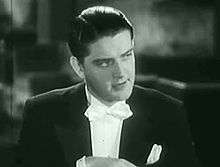Hugh Trevor
Hugh Trevor (October 28, 1903 – November 10, 1933), born Hugh Trevor-Thomas in 1903, was an American actor whose short career began at the very end of the silent era in 1927. He would appear in nineteen films in the scant six years during which he was active. He did not fare well with the advent of talking pictures, and retired from the industry in 1931. His life was cut short when he unexpectedly died from complications following appendectomy surgery in 1933.
Hugh Trevor | |
|---|---|
 Trevor in the 1930 film, The Pay-Off | |
| Born | Hugh Trevor-Thomas October 28, 1903 Yonkers, New York, US |
| Died | November 10, 1933 (aged 30) Los Angeles, California, US |
| Occupation | Actor |
| Years active | 1927–1933 |
Personal
Trevor was born on October 28, 1903, in Yonkers, New York.[1] He studied at Harvard University.[2] After college, he began a successful insurance business. In 1925, through his uncle, producer William LeBaron,[3] he went to sell an insurance policy to Richard Dix,[4] the film star. Dix was impressed by Trevor, and arranged for him to screen test, which Dix himself directed.[5]
Film career
Subsequent to his screen test, Trevor made his film debut in the 1927 film, Ranger of the North, where he played second fiddle to the dog star, Ranger. Although he would work for several studios, the bulk of his films were produced by F.B.O. Productions (FBO – also known as FBO Pictures Corporation), and later by RKO Radio Pictures, after FBO was merged with RCA to form RKO. While he never worked with Dix, he did work with other famous film figures of that era, including Mary Astor, Bryant Washburn, Chester Conklin, Noah Beery, the comedy team of Wheeler & Woolsey (Bert Wheeler and Robert Woolsey), Betty Compson, and Lowell Sherman.[6] In 1929, Trevor was romantically linked with actress Aileen Pringle, following their working together on the film Beau Broadway the prior year.[7][8] During his film career he was also romantically linked with another co-star, Betty Compson, who at one point was considering marrying him (after her divorce from James Cruze).[3][9]
After the creation of RKO, Trevor would also work with his relative, William LeBaron.[6] As the film industry transitioned into sound pictures, studios would create films in both sound and silent versions. Trevor's film, Love in the Desert, was one such film, and he and his co-star, Olive Borden, were featured in Photoplay magazine highlighting the new "Photophone" sound process.[10] However, with the onset of talking pictures, his career began to fade,[5] and he retired from the film industry in 1931,[2] his last film being RKO's The Royal Bed.[6]
Later career
After leaving films, he remained in Los Angeles, returning to the insurance industry, where he went into partnership with James Ryan, specializing in policies to those in the film industry.[2] In 1933, less than two weeks after his thirtieth birthday, he suffered from appendicitis. He died of complications from the resulting appendectomy, and was buried in Hollywood Forever Cemetery.
Filmography
| Year | Title | Role | Silent (S)/Talkie (T) | Notes |
|---|---|---|---|---|
| 1927 | Ranger of the North | Bob Fleming | S | |
| 1928 | Beau Broadway | Killer Gordon | S | |
| 1928 | Dry Martini | Bobbie Duncan | S | |
| 1928 | Her Summer Hero | Kenneth Holmes | S | |
| 1928 | Hey Rube! | String | S | |
| 1928 | The Pinto Kid | Dan Logan | S | |
| 1928 | Red Lips | "Spike" Blair | S | |
| 1928 | Skinner's Big Idea | Jack McLaughlin | S | |
| 1928 | Taxi 13 | Dan Regan | S | |
| 1928 | Wallflowers | Rufus | S | |
| 1929 | Love in the Desert | Bob Winslow | S & T | |
| 1929 | Night Parade | Bobby Murray | T | |
| 1929 | The Very Idea | Joe Garvin | T | |
| 1930 | Conspiracy | John Howell | T | |
| 1930 | The Cuckoos | Billy | T | |
| 1930 | Half Shot at Sunrise | Lieut. Jim Reed | T | |
| 1930 | Midnight Mystery | Gregory Sloane | T | |
| 1930 | The Pay-Off | Rocky | T | |
| 1931 | The Royal Bed | Crown Prince William | T |
References
- "Hugh Trevor". Theiapolis.com. Retrieved September 28, 2014.
- Scott, Tony (March 13, 2006). "The Stars of Hollywood Forever". Turner Classic Movies. Archived from the original on September 28, 2014. Retrieved September 28, 2014.
- "Cal York's Monthly Broadcast from Hollywood". Photoplay. May 1931. p. 80.
- "The Answer Man". Motion Picture Magazine. January 1931. p. 115.
- "Hugh Trevor Biography". Fandango.com. Archived from the original on September 28, 2014. Retrieved September 28, 2014.
- "Hugh Trevor filmography". American Film Institute. Retrieved September 28, 2014.
- "Hollywood – A Manless Town". Photoplay. September 1929. p. 42.
- "Gossip of all the Studios". Photoplay. November 1929. p. 105.
- "They say that – Quaint Quips". Motion Picture News. September 20, 1930. p. 43.
- "Hello, Readers!". Photoplay. October 1929. p. 72.
External links
| Wikimedia Commons has media related to Hugh Trevor. |
- Hugh Trevor on IMDb
- Hugh Trevor at the TCM Movie Database
